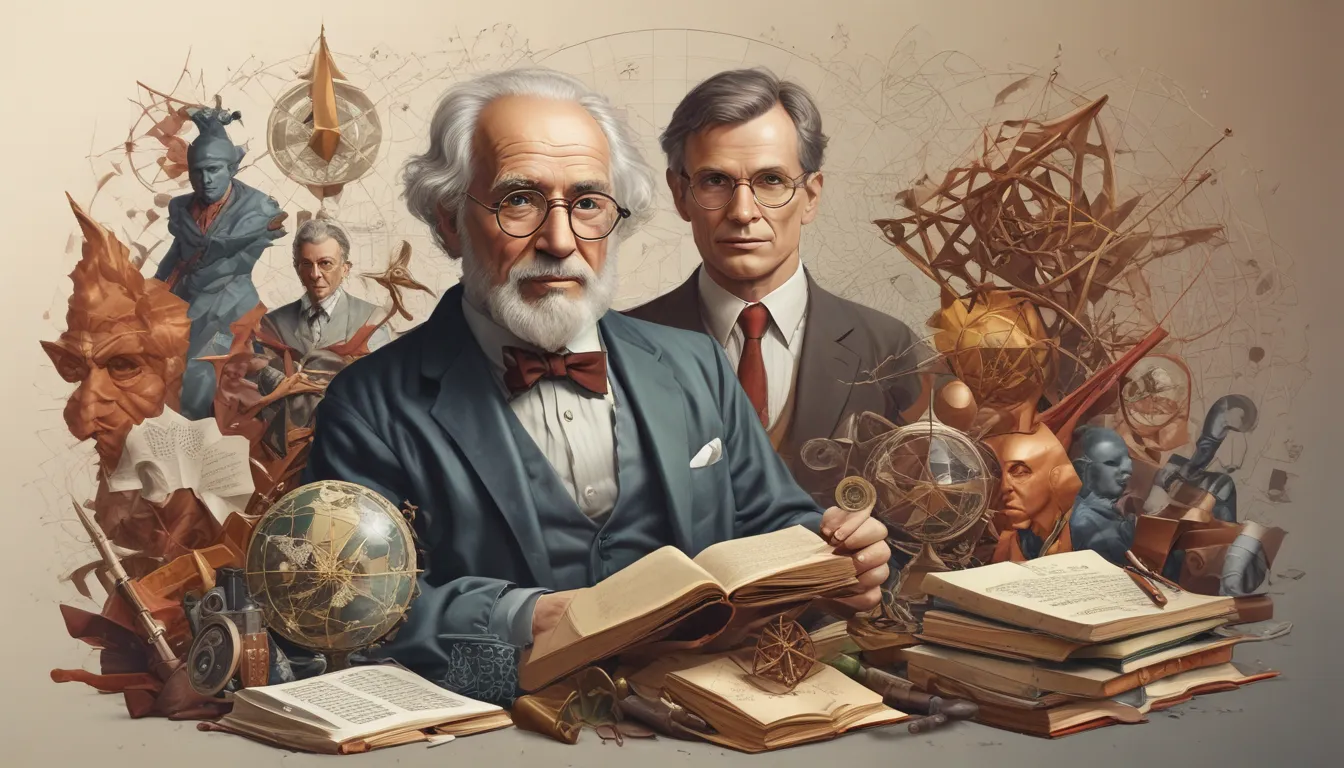The images in our articles may not match the content exactly. They are used to grab your attention, not to show the exact details in the text. The images complement the text but do not replace it.
Mathematicians are often unsung heroes, yet their contributions have had a profound impact on the world as we know it today. From laying the groundwork for scientific advancements to revolutionizing the field of mathematics, these brilliant minds have shaped history in ways that many people may not fully appreciate. In this article, we will explore the lives and works of some of the world’s most famous mathematicians, honoring their brilliance and shedding light on their invaluable contributions.
Sir Isaac Newton: The Light of the Scientific Revolution
Sir Isaac Newton, a prominent figure in the world of mathematics and science, is renowned for his groundbreaking work in calculus, physics, and universal gravitation. His laws of physics are foundational to our understanding of the physical world, and his contributions have paved the way for countless scientific advancements. Newton’s legacy as the light of the Scientific Revolution continues to inspire generations of thinkers and innovators.
Blaise Pascal: The Genius Behind the Mechanical Calculator
Blaise Pascal, a French mathematician and inventor, is credited with the creation of the mechanical calculator, which revolutionized the world of computation. In addition to this groundbreaking invention, Pascal also clarified concepts related to vacuum, pressure, and probability, showcasing his exceptional intellectual prowess and innovative spirit.
Leonhard Euler: The Master of Trigonometry
Leonhard Euler, a Swiss mathematician, is best known for his work in developing Euler’s formula, a fundamental equation in trigonometry. By introducing the concept of functions and assigning letters to represent mathematical variables, Euler made significant contributions to the field of mathematics that continue to impact modern calculations and algorithms.
James Maxwell: Connecting Electromagnetism and Light
James Maxwell, a Scottish mathematician, made significant strides in the field of classical electromagnetic theory, uniting concepts of magnetism, optics, and electricity. His work led to the creation of the world’s first colored photograph, showcasing the profound impact that mathematics can have on scientific innovation and discovery.
Thomas Bayes: The Minister Who Pioneered Predictive Statistics
Thomas Bayes, a Presbyterian minister, developed Bayes’ Theorem, a groundbreaking concept in predictive statistics that allows for computation through conditional probabilities. His contributions to the field of mathematics have shaped the way we understand and predict uncertain outcomes, highlighting the importance of mathematical principles in decision-making and analysis.
Pierre-Simon Laplace: A Pioneer in Probability Theory
Pierre-Simon Laplace’s work in systematizing probability theory laid the foundation for modern statistics, particularly Bayesian statistics. His contributions to mathematical astronomy, the study of speed and sound, and the proposition of the existence of black holes showcase the breadth of his intellectual curiosity and groundbreaking insights.
Charles Babbage: The Father of Computer Science
Charles Babbage, an English inventor and mathematician, is revered as the “Father of Computer Science” for his pioneering work in proposing the invention of a mechanical computing device. While his designs were not fully realized during his lifetime, Babbage’s vision laid the groundwork for the development of modern computers and the digital age.
Ada Lovelace: The First Computer Programmer
Ada Lovelace, a countess and daughter of Lord Byron, is celebrated as the first computer programmer in the world. Collaborating with Babbage on analytical engines, Lovelace’s insightful contributions to computer programming have had a lasting impact on the field of technology, earning her the title of “Enchantress of Numbers” and solidifying her place in history as a pioneer in computing.
Alan Turing: Breaking the Enigma Code and Pioneering Computer Science
Alan Turing, a British mathematician, is hailed as the “Father of Computer Science” for his groundbreaking work in breaking the German Enigma code during World War II. His contributions to the development of computers and cryptography were instrumental in Allied efforts during the war, showcasing the powerful intersection of mathematics and technology in times of crisis.
David Hilbert: A Patron Saint of Math Teachers
David Hilbert, a leader in the field of mathematics, is revered for his contributions to functional analysis and proof theory. His creation of a legendary collection of unsolved problems in mathematics inspired generations of mathematicians and sparked innovation in the 20th-century mathematical landscape, solidifying his legacy as a patron saint of math teachers.
Gottfried Leibniz: The Inventor of Calculus and Binary Number System
Gottfried Leibniz, a prolific mathematician and philosopher, independently invented infinitesimal calculus and refined the binary number system. Despite living in the shadow of Newton, Leibniz’s contributions to mathematics laid the groundwork for the development of digital computers and computational systems, showcasing his innovative spirit and analytical prowess.
Euclid of Alexandria: The Father of Geometry
Euclid of Alexandria, an ancient Greek mathematician, is revered as the father of geometry for his foundational work in Euclidean Geometry and mathematical proofs. His contributions to mathematical theory and methodology have shaped the discipline of mathematics for centuries, highlighting the enduring relevance of his teachings and principles.
Joseph Lagrange: The Pioneer of Partial Differential Equations
Joseph Lagrange’s groundbreaking work in creating the science of partial differential equations revolutionized the field of mathematics. His contributions to modeling sound, electrodynamics, and heat, as well as his simplification of Newton’s classical mechanics, showcase the depth of his mathematical insights and innovative thinking.
John von Neumann: A Visionary in Pure and Applied Mathematics
John von Neumann, a pioneering mathematician, was instrumental in the development of the concept of digital computers and key advancements in applied fields. His contributions to game theory, Mutually Assured Destruction theory, and self-replicating automata during the Cold War era demonstrate his visionary thinking and interdisciplinary approach to mathematical innovation.
Carl Friedrich Gauss: The Architect of Gaussian Distribution
Carl Friedrich Gauss’s formulation of the Gaussian distribution, also known as the bell-curve normal distribution, is a fundamental element of modern statistics. His contributions to mathematics, including his work on electromagnetism and the design of the first electromagnetic telegraph, showcase his versatility and enduring impact on the field of mathematics.
Pythagoras: The Master of Right-Angled Triangles
Pythagoras, an ancient Greek mathematician and mystical leader, is best known for his eponymous theorem relating to right-angled triangles. His work in geometry and number theory laid the foundation for mathematical principles that continue to be taught and studied today, highlighting the enduring legacy of his mathematical discoveries.
Katherine Johnson: The Hidden Figure Behind Space Exploration
Katherine Johnson, an American mathematician, played a crucial role in calculating the trajectories for NASA’s early space flights, including the Apollo missions. Her contributions to space exploration paved the way for groundbreaking achievements in science and technology, showcasing the vital role of mathematics in shaping human endeavors beyond Earth.
Johannes Kepler: Unraveling the Laws of Planetary Motion
Johannes Kepler, a German mathematician, astrologer, and astronomer, revolutionized our understanding of planetary motion with his three laws of planetary motion. His foundational work in optics and the invention of the Keplerian telescope laid the groundwork for Newton’s universal gravitation theory, showcasing the profound impact of his astronomical insights on scientific discovery.
Sophie Germain: A Trailblazer in Mathematics and Philosophy
Sophie Germain, a French mathematician, physicist, and philosopher, defied social prejudices to pursue her passion for mathematics and science. Her groundbreaking work in number theory and elasticity theory, as well as her correspondence with renowned mathematicians like Gauss and Lagrange, established her as a trailblazer in the field of mathematics and a celebrated figure in scientific history.
Srinivasa Ramanujan: The Mathematical Prodigy from India
Srinivasa Ramanujan, an Indian mathematician, made remarkable contributions to the theory of numbers, infinite series, and partition functions. Despite lacking formal training in pure mathematics, Ramanujan’s genius in solving complex mathematical problems and formulating unsolvable solutions has solidified his reputation as one of the greatest mathematical prodigies in history, showcasing the universal language of mathematics that transcends cultural boundaries.
In Conclusion
The world of mathematics is enriched by the brilliant minds and innovative spirit of these famous mathematicians. Their contributions have shaped the way we understand the world around us and have paved the way for scientific advancements that continue to drive progress and innovation. By celebrating and honoring the legacy of these remarkable individuals, we recognize the transformative power of mathematics in changing the world, one solution at a time.






